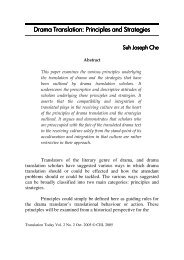Re-Evaluation of Lin Shu (the Chinese Translator) - National ...
Re-Evaluation of Lin Shu (the Chinese Translator) - National ...
Re-Evaluation of Lin Shu (the Chinese Translator) - National ...
You also want an ePaper? Increase the reach of your titles
YUMPU automatically turns print PDFs into web optimized ePapers that Google loves.
160 <strong>Re</strong>-<strong>Evaluation</strong> <strong>of</strong> <strong>Lin</strong> <strong>Shu</strong> (<strong>the</strong> <strong>Chinese</strong> <strong>Translator</strong>):A Systemic Approach to Literary TranslationThe Poetics <strong>of</strong> <strong>Chinese</strong> Literature in Early Modern Times<strong>Translator</strong>s and target readers live in <strong>the</strong> target culture. Themainstream literary form and popular poetics affect <strong>the</strong> wholeprocess <strong>of</strong> literary translation to a large extent (Yang Liu, 2001: 48).Poetics <strong>of</strong> <strong>Chinese</strong> literature and popular literary form in earlymodern China greatly influenced <strong>Lin</strong> <strong>Shu</strong>’s translation.1.1 A. The Change <strong>of</strong> Literary Theory in Early Modern China<strong>Chinese</strong> literature in early modern times is a kind <strong>of</strong>transitional literature. On <strong>the</strong> one hand, it is <strong>the</strong> continuation <strong>of</strong>classical literature; on <strong>the</strong> o<strong>the</strong>r hand, it is <strong>the</strong> base <strong>of</strong> modernliterature. Great changes occurred in <strong>Chinese</strong> literature during thisperiod.In <strong>Chinese</strong> literary history, literature has always beenconceived as a vehicle <strong>of</strong> Way (Yi Wen Zai Dao). Specificallyspeaking, literature has been a tool to spread Confucian ideas.However, in early modern times <strong>the</strong> content <strong>of</strong> “Way” changed.Just before <strong>the</strong> Opium War, famous scholars such as GongZizhen (1792-1841) and Wei Yuan (1794-1857) paid much attentionto <strong>the</strong> practical knowledge <strong>of</strong> managing state affairs. They criticized<strong>the</strong> status quo <strong>of</strong> <strong>Chinese</strong> literature in which literature lost contactwith reality (Guo Yanli & Wu Runting, 2003: 101). After <strong>the</strong> OpiumWar, Wang Tao (1828-1897), Feng Guifen (1809-1874) and o<strong>the</strong>rliterati stressed <strong>the</strong> close relationship between literature and realityas well as <strong>the</strong> social function <strong>of</strong> literature (ibid: 106). During thisperiod, “Way” was understood to be <strong>the</strong> practical knowledge whichwas concerned with <strong>the</strong> call for saving <strong>the</strong> nation through industrialdevelopment (ibid: 107).
















